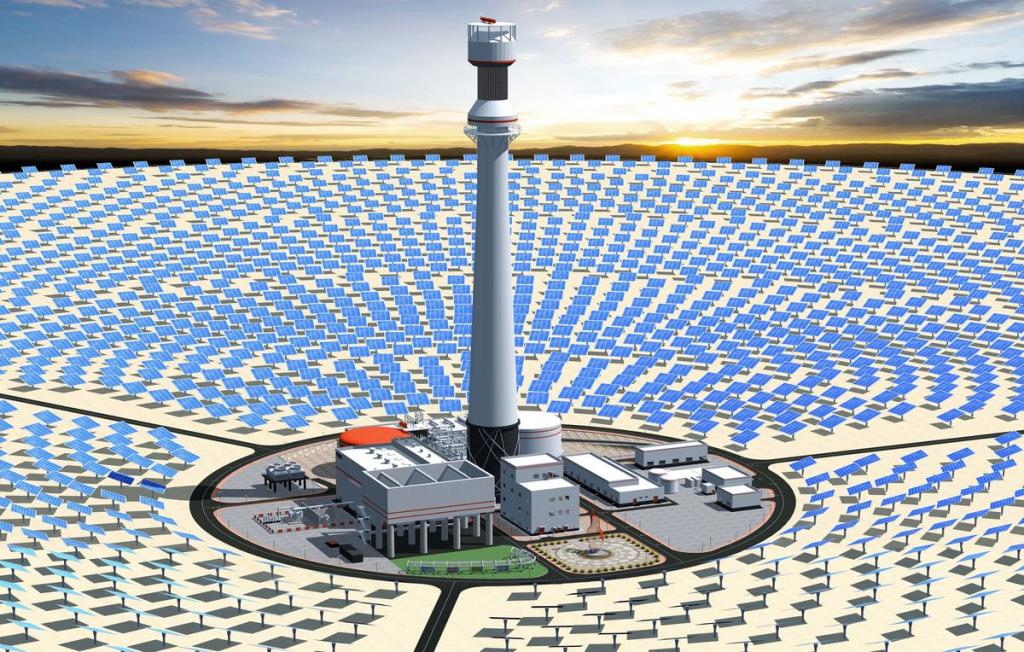CMI Solar and SEPCO III: a contract for a new Molten Salt Solar Receiver in China

February 01st 2018
CMI Solar was awarded a contract for the design and supply of a Molten Salt Solar Receiver (MSSR) for the 50 MWe “Haixi” solar tower in Qinghai province (China) by the top Chinese EPC contractor Shandong Electric Power Construction Corporation III (SEPCO III).
In December 2017, SEPCO III, one of the top Chinese EPC contractors, known for its interest in CSP technology both in China and overseas, chose CMI Energy’s central receiver for its 50 MWe Molten Salt solar tower for the Haixi project (also known as “Luneng project”, after its owner name, the Luneng company).
The renewable energy power plant of Haixi, located in the province of Qinghai (China), is part of the Chinese 23 multi-energy projects and will combine CSP, PV and wind, a unique mix of renewable energies on the same site. It will be located in a high altitude desert environment, with severe weather conditions and it will feature 12 hours of thermal energy storage.
On the basis of CMI’s long expertise in the design of boilers and heat exchangers, CMI Energy has been working for years at optimizing the central tower solar receiver technology, offering worldwide Molten Salt Solar Receivers (MSSR) with the quality, flexibility and reliability required by such large scale projects. After commercial successes in South Africa and Chile, this new order confirms CMI’s leadership in the field of Molten Salt Solar Receivers (MSSR).
Molten Salt Plants: Dispatchability and Overnight Power Generation
One of the best ways to insure dispatchability or even overnight electricity production is to store absorbed solar energy in molten salts: a low-cost, flame-proof and non-polluting fluid.
In a Solar Tower, CMI’s solar receiver first converts the absorbed solar energy into thermal energy by heating molten salt, which is stored in the hot molten salt storage tank. Steam can then be produced on demand by pumping the hot molten salt through a steam generator (another product available in CMI Solar portfolio). Cold molten salts are returned to a cold molten salt tank, from which they are sent to the solar receiver to be heated again.
CMI Energy’s receiver consists of vertical heat exchanger tube panels through which molten salt absorbs the energy of the concentrated solar flux. This heat flux reaching the receiver can exceed 1000 kW/m² (more than 1000 times the natural solar flux at the most exposed places on earth) and leads to high local metal temperature, requiring to use special materials like stainless steels and nickel alloys. These extreme temperatures induce stress, creep, fatigue and other specific phenomena that CMI expertise as a renowned boiler designer and manufacturer allows to know and have under control for a maximum reliability.
A major operational risk for the receiver is overheating due to a locally excessive incident flux. To mitigate that risk, CMI developed a system to closely monitor the thermo-mechanical behavior of the heat exchanger panels thanks to a network of infrared cameras. The system also evaluates in real time the thermal stress at every point of the panels. This allows to always operate at the maximum capacity without any risk of damaging the receiver.
CMI’s receiver also features a patented insulated airtight casing, a unique patented maintenance crane system and many other features allowing a maximum quality and reliability.
A successful step forward in China
CMI has already a long commercial relationship with China, dating back to 1900 when a Chinese delegation visited the CMI headquarters in Seraing (Belgium). This relationship continued throughout the 20th and 21st centuries with, among others, the supply of Heat Recovery Steam Generators and steel processing lines by CMI.
Today, CMI is proud to be trusted by SEPCO 3 for the supply of one of its key equipment for their first solar tower in China and is looking forward to being the trusted partner in CSP for the many future solar projects in the coming years.

